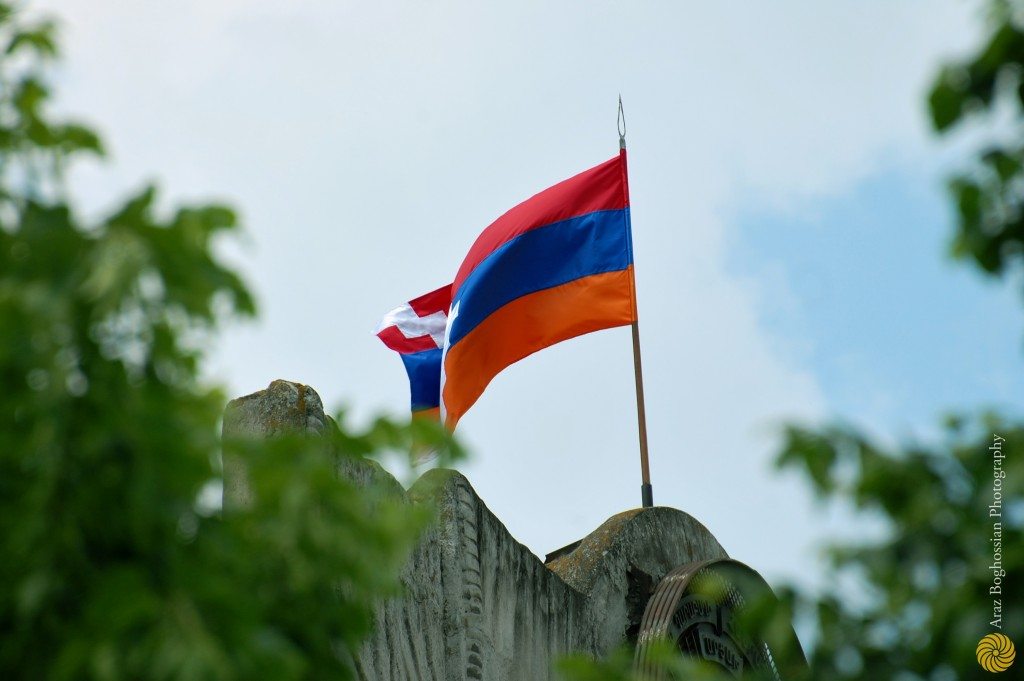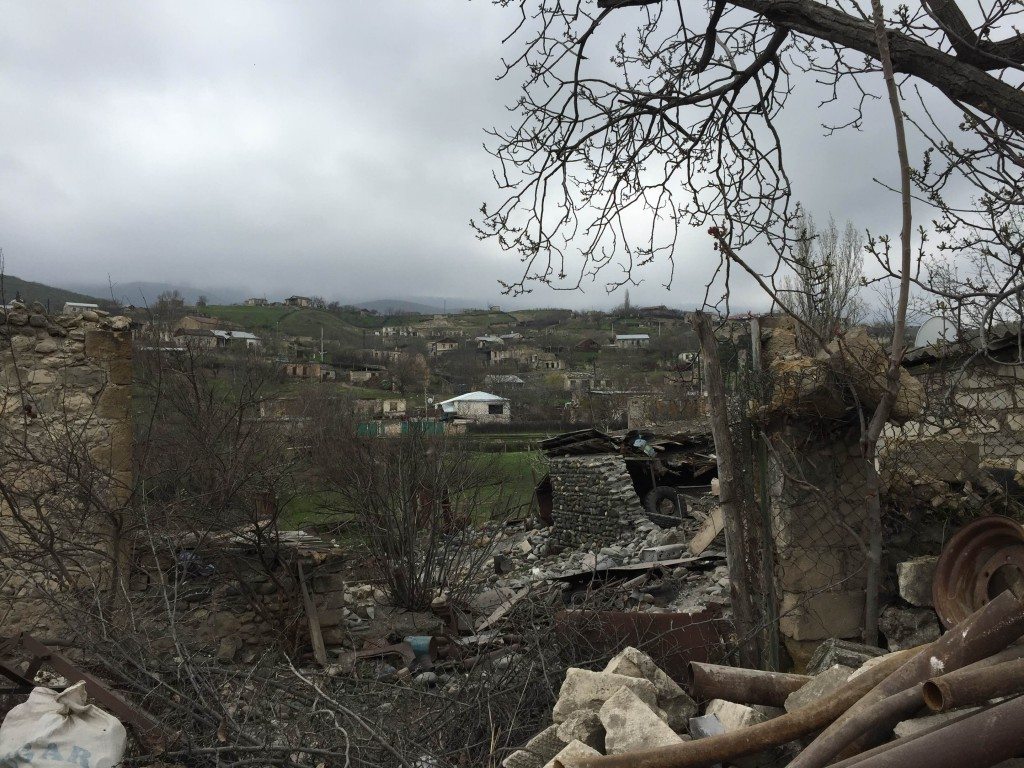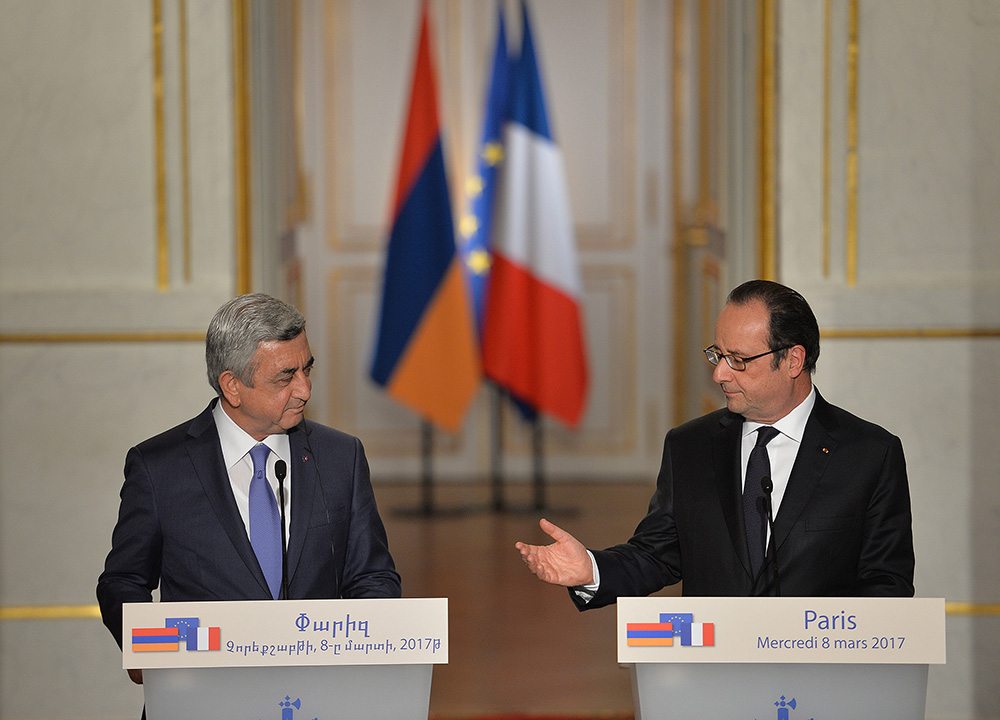Special for the Armenian Weekly
One year ago, Azerbaijan launched a full-scale military offensive against the Artsakh Republic along the Line of Contact (LoC). Failure by the command structure to heed the available intelligence credits the Azerbaijani forces with a surprise attack that not only put our soldiers at risk, but the civilian population of Artsakh as well. With some 80 percent of the Armenian population within 20 miles of the LoC, we cannot afford to depend solely on the proven dedication of our soldiers to protect Artsakh.
Unfortunately, nothing can replace real time intelligence and the proper maintenance and availability of equipment and supplies. These failures during the 2016 April War allowed Azerbaijan to extract a dear price in casualties and the loss of strategic terrain, small as it may have been. Note that the Organization for Security and Cooperation in Europe (OSCE) Minsk Group has not objected to Azerbaijan’s occupation of this terrain, nor have they made any effort to have it returned to Artsakh.
Since the April War, there has been no let-up in Azeri sponsored violations. Azerbaijan has continued to attack our forward position with sniper fire, mortar and artillery shells, and never ending probing actions causing casualties that we can ill afford to sustain indefinitely. The Minsk Group countries seem more concerned with protecting their geostrategic interests vis-a-vis Azerbaijan (as well as with Turkey) than in responding to Azerbaijani President Ilham Aliyev’s military adventurism that creates a potentially explosive situation along the LoC.
Given the parochial national interests of the Minsk Group countries, their hands-off policy with respect to Azerbaijan is not about to change in the near future, if at all. In fact, the Co-chairs are as much a part of the problem as is Azerbaijan.
As a result, the passing year has brought us no closer to independence. Negotiations continue, but without any substantive results. President Aliyev’s constant reference to Azerbaijan’s military strength and setting-up Armenians as the strawman for his country’s ills has actually benefitted us. As a result, he has put himself in a position where any compromise could very well result in a coup d’etat by the military, which would end his family’s political and financial dynasty. To strengthen his hold on power, a rigged referendum in 2016 created the position of Vice President, to which the President appointed his wife Mehriban Aliyeva. He is engaged in a high stakes gamble that has no guarantee of success.
Objectively, we are on the losing end of the negotiation process through no fault of our own. However, as has been mentioned many times in the past, the negotiation process was never meant to result in Artsakh’s independence.
Let us look at the recent comment of President Francois Hollande of France, a friend of Armenia. When he met with the Coordinating Council of Armenian Organizations of France in Paris recently he commented that “we must open real negotiations for the resolution of the [Artsakh] conflict. We need to find elements of conflict resolution. We know them: they have been fixed; these are the Madrid principles… They will lead, if they are applied, to the self-determination of Nagorno-Karabagh.” Note the reference to Nagorno-Karabagh and not Artsakh. How can that be of comfort to Artsakh; to the Diasporan Armenians; or to Armenian President Serge Sarkisian (though Sarkisian seems to support evacuating the liberated territories to achieve peace in the region)?
The Madrid Proposals are anathema to Artsakh’s independence and, obviously, to its unification with Armenia. The phased process that the Madrid Proposals require work against our best interests. Each phase, if implemented, incrementally weakens our military and demographic position in Artsakh.
In return for giving up control not only of the liberated territories, but Karabagh itself for which some 7,000 azatamartiks (freedom fighters) died, an international peace-keeping force will be stationed in Azerbaijan’s Nagorno-Karabagh region to protect our people. Against whom? Against the government and the Azerbaijani civilian population until such time a plebiscite is held to determine Karabagh’s status. By the time voting takes place, the demographic composition of Karabagh will have become predominately Azerbaijani. For us to believe that Karabagh’s independence can be the outcome of the plebiscite is beyond being naive.
The same Francois Hollande, in a meeting with President Sarkisian, suggested that there might be a need to impose sanctions if the violations continue. Is he referring to Azerbaijan? Yet nothing is done to pressure Azerbaijan when it refuses to deploy the sound verification system agreed to with Armenia. Isn’t this sufficiently egregious to elicit a stern response by the Minsk Group or to consider applying sanctions as suggested by President Holland? Obviously not.
In the same vein, Russia’s Foreign Minister Sergei Lavrov reminded Azerbaijan that reclaiming the “occupied territories” (liberated lands) is not an internal matter. Neither is military action an alternative to a negotiated settlement. That was somewhat comforting to our side. He then stressed the importance of adhering to the process based on the Madrid Proposals which should not be comforting for us. Within weeks after that comment he replied to a question as to whether or not Armenia should be concerned with the apparent Russian-Turkish rapprochement. Again, his response was not reassuring.
“This normalization of relations between Russia and Turkey should not be regarded as a process that may harm other states.” He continued by saying that Russia has an interest in the “…opening of the Armenian-Turkish segment of the EAEU’s external border for the free movement of people, goods, and services.”
Two things should be understood. The benefits for Armenia of an open border with Turkey are illusory. I have made that point numerous times in the past. Turkey has a Gross Domestic Product (GDP) of over $850 billion (give or take a few). Armenia’s GDP is between $10-11 billion. Within a decade after the border is open, Turkey would dominate the Armenian market and whatever Russia did not own, Turkey would. We would literally be mortgaged politically and economically to both countries. The benefits of an open border would flow to the politically connected in Russia (as it presently does), Turkey, and the oligarchs of Armenia who have been bleeding our country dry since independence was declared. The losers as always would be the citizens of Armenia and Artsakh.
The second point to consider is that Foreign Minister Lavrov should realize that a genocidal mindset has blinded every Turkish leader from Ataturk to Erdogan with respect to Armenians and Armenian culture. The leaders of Azerbaijan have had the same mindset. Any rapprochement with Turkey must wait for the successful unification of Artsakh with Armenia. This is, above all else, a moral imperative that the western democracies (including the United States) and Russia owe the Armenian people. To make matters worse, we have Armenians such as former President Levon Ter Petrosyan, who work against Artsakh’s and our nation’s interests. He would return the liberated territories; supports the Madrid Proposals; and believes that a promised plebiscite could yield independence for Nagorno-Karabagh. He is wrong on all three counts.

‘Not only is the independence of Artsakh at stake, but the future of a unified greater Armenia as well. Can there be any issue of greater importance than this?’ (Photo: Araz Boghossian)
It is unfortunate that the countries represented by the Minsk Group co-chairs have yet to properly define the real issue posed by the Karabagh conflict. It is even more regrettable that our leaders have done nothing to address this serious error. The territorial integrity of Azerbaijan is not the issue. It has been accepted by the European Union and the United States to avoid the de jure recognition of Artsakh and by Russia so that it can continue to play both sides against the middle. Exercising the principle of self-determination cannot be denied because the territorial integrity of the affected state would be affected. As stated many times before, the claim of territorial integrity by Azerbaijan would be valid only if it had been invaded by Armenia. Such was not the case. Armenia’s humanitarian intervention does not rise to the level of a military invasion of a neighboring country. Again, our leaders have failed completely in countering this specious claim by Azerbaijan.
Why was humanitarian intervention necessary? It was based on the evolving concept of a government’s Responsibility to Protect (R2P) minorities from harm within its political jurisdiction. Azerbaijan failed to protect the Armenian minority in Sumgait, Baku, and Kirovabad (Ganja) because it was the government itself that was responsible for the harm being inflicted. This harm, rising to the level of genocidal intent, continued during the war initiated by Azerbaijan, in Maraga and during the ceaseless bombardment of unprotected civilian areas of Stepanakert from the heights of neighboring Shushi. Without the humanitarian intervention by military forces from neighboring Armenia, the Armenian population of Karabagh would have been decimated. Armenia’s humanitarian intervention in Azerbaijan to save a vulnerable population from a genocide was based on its interpretation of the R2P concept.
One year after the April War (2016) the situation is less than promising for several reasons. 1. Our casualties due to Azeri violations along the LoC continue unabated. 2. The LoC still remains a volatile boundary. The sound locator system agreed to and then denied by Azerbaijan cannot be deployed. 3. The negotiations are still wedded to the Madrid Proposals that do not provide for Artsakh’s ultimate independence. 4) Finally, we continue to participate in a process where Azerbaijan’s territorial integrity and not Artsakh’s declaration of independence is driving the entire negotiating process.
Azerbaijan has successfully seized upon a principle (territorial integrity) historically recognized that is embedded in the Helsinki Accords and in the Charter of the United Nations that serves as the basis for the Madrid Proposals. We seem oblivious to the fact that Artsakh’s independence is still not what this is all about. It is about making Azerbaijan territorially whole again. It is difficult to understand why there is such an obvious lack of effort by our leaders in government as well as the leaders of our political parties to counter this claim by Azerbaijan. Not only is the independence of Artsakh at stake, but the future of a unified greater Armenia as well. Can there be any issue of greater importance than this?
Source: Armenian Weekly
Link: Artsakh: One Year After the April War


